Settlements
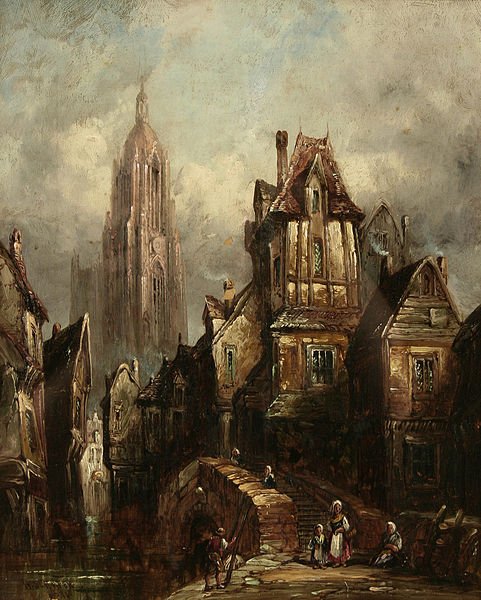
The best way to handle settlements in your game, of course, is to plan it out, placing every shop and every home, naming every NPC, and mapping every building. Yet settlements are the most complicated locations you’re likely to ever feature in your game, and the prospect of fully detailing one is daunting, especially if your PCs are likely to visit multiple settlements.
Presented below are basic rules for a more streamlined method of handling settlements in your game. Essentially, these rules treat settlements almost as characters of their own, complete with stat blocks. Using these rules, you can generate the vital data for a settlement quickly and efficiently, and with this data you can handle the majority of your players’ interactions with the settlement.
Note that for particularly large cities, you can use multiple settlement stat blocks to represent different districts within a city. This allows you to have neighborhoods with distinct characteristics inside one city’s walls. GMs should feel free to add other new elements to create the cities they desire.
The Settlement Stat Block
A settlement stat block is organized as follows.
Name The settlement’s name is presented first.
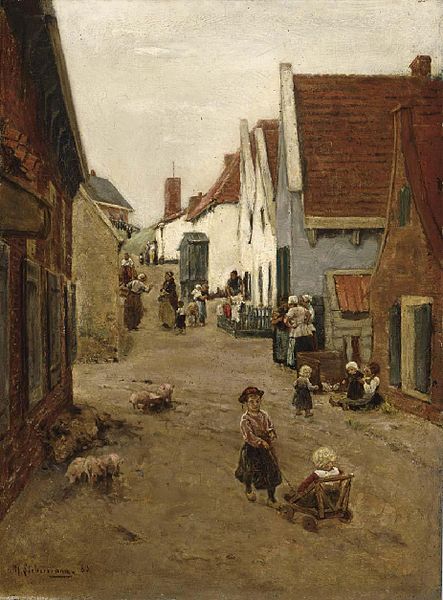
Alignment and Type A settlement’s alignment is the general alignment of its citizens and governmentindividuals who dwell therein can still be of any alignment, but the majority of its citizens should be within one step of the settlement’s overall alignment. Alignment influences a city’s modifiers. The type is the size category the settlement falls into, be it thorpe, hamlet, village, town (small or large), city (small or large), or metropolis. In most cases, rules play off of a settlement’s type rather than its exact population total. A settlement’s type determines many of its statistics (see Table: Settlement Statistics).
Modifiers Settlements possess six modifiers that apply to specific skill checks made in the settlement. A settlement’s starting modifier values are determined by its type. This value is further adjusted by the settlement’s alignment, government, qualities, and disadvantages. Note that introducing settlement modifiers to your game will somewhat increase the complexity of skill checks by adding a variable modifier each time the PCs visit a new town or city consider the use of these modifiers an optional rule.
Qualities All settlements have a certain number of qualities that further adjust their statistics – think of qualities as feats for settlements. A settlement’s type determines how many qualities it can have.
Danger A settlement’s danger value is a number that gives a general idea of how dangerous it is to live in the settlement. If you use wandering monster chart that uses percentile dice and ranks its encounters from lowest Cr to highest CR, use the modifier associated with the settlement’s danger value to adjust rolls on the encounter chart. A settlement’s base danger value depends on its type.
Settlement Population Ranges
A settlement’s population is left to the GM to assign, but you can use a settlement’s type to help you determine just how many folks live in the city. Since the actual number of people who dwell in a settlement has no impact on game play, the number you choose is largely cosmeticfeel free to adjust the suggested values below to fit
your campaign.
| Settlement Type | Population Range |
| Thorp | Fewer than 20 |
| Hamlet | 21-60 |
| Village | 61-200 |
| Small town | 201-2,000 |
| Large town | 2,001-5,000 |
| Small city | 5,001-10,000 |
| Large city | 10,001-25,000 |
| Metropolis | More than 25,000 |
Disadvantages Any disadvantages a settlement might be suffering from are listed on this line. A settlement can have any number of disadvantages you wish to inflict on it, although most settlements have no disadvantages.
Government This entry lists how the settlement is governed and ruled. The type of government a settlement follows affects its statistics.
Population This number represents the settlement’s population. Note that the exact number is flexible; a settlement’s actual population can swell on market days or dwindle during winterthis number lists the average population of the settlement.
Note that this number is generally used for little more than flavorsince actual population totals fluctuate, it’s pointless to tether rules to this number. After the settlement’s total population, a breakdown of its racial mix is listed in parentheses.
Notable NPCs This section lists any notable NPCs who live in the city, sorted by their role in the community, followed by their name and then their alignment, gender, race, class, and level in parentheses.
Base Value and Purchase Limit This section lists the community’s base value for available magic items in gp (see Table: Available Magic Items). There is a 75% chance that any item of this value or lower can be found for sale in the community with little effort. If an item is not available, a new check to determine if the item has become available can be made in 1 week. A settlement’s purchase limit is the most money a shop in the settlement can spend to purchase any single item from the PCs. If the PCs wish to sell an item worth more than a settlement’s purchase limit, they’ll either need to settle for a lower price, travel to A larger city, or (with the GM’s permission) search for a specific buyer in the city with deeper pockets. A settlement’s type sets its purchase limit.
Spellcasting Unlike magic items, spellcasting for hire is listed separately from the town’s base value, since spellcasting is limited by the level of the available spellcasters in town. This line lists the highest-level spell available for purchase from spellcasters in town. A town’s base spellcasting level depends on its type.
Minor Items/Medium Items/Major Items This line lists the number of magic items above a settlement’s base value that are available for purchase. In some city stat blocks, the actual items are listed in parentheses after the die range of items available – in this case, you can use these pre-rolled resources when the PCs first visit the city as the magic items available for sale on that visit. If the PCs return to that city at a later date, you can roll up new items as you see fit.
| Settlement Statistics | ||||||
| Type | Modifiers | Qualitites | Danger | Base Limit | Purchase Limit | Spellcasting |
| Thorp | -4 | 1 | -10 | 50 gp | 500 gp | 1st |
| Hamlet | -2 | 1 | -5 | 200 gp | 1,000 gp | 2nd |
| Village | -1 | 2 | 0 | 500 gp | 2,500 gp | 3rd |
| Small town | 0 | 2 | 0 | 1,000 gp | 5,000 gp | 4th |
| Large town | 0 | 3 | 5 | 2,000 gp | 10,000 gp | 5th |
| Small city | +1 | 4 | 5 | 4,000 gp | 25,000 gp | 6th |
| Large city | +2 | 5 | 10 | 8,000 gp | 50,000 gp | 7th |
| Metropolis | +4 | 6 | 10 | 16,000 gp | 100,000 gp | 8th |
| Available Magic Items Community Size Base Value Minor Medium Major | ||||
| Thorp | 50 gp | 1d4 items | – | – |
| Hamlet | 200 gp | 1d6 items | – | – |
| Village | 500 gp | 2d4 items | 1d4 items | – |
| Small town | 1,000 gp | 3d4 items | 1d6 items | – |
| Large town | 2,000 gp | 3d4 items | 2d4 items | 1d4 items |
| Small city | 4,000 gp | 4d4 items | 3d4 items | 1d6 items |
| Large city | 8,000 gp | 4d4 items | 3d4 items | 2d4 items |
| Metropolis | 16,000 gp | * | 4d4 items | 3d4 items |
| * In a metropolis, nearly all minor magic items are available. |
Guards! Guards!
Source Pathfinder RPG GameMastery Guide
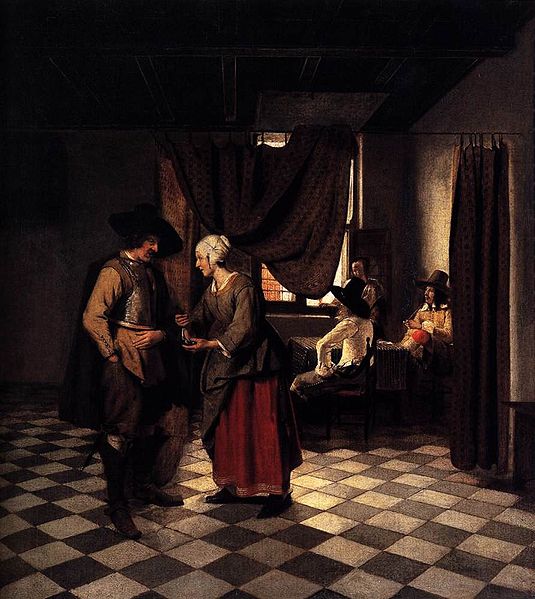
It’s inevitable – sooner or later, the PCs will want to call upon the town guard or cause a situation where citizens do so instead. Calling for the guard requires a Diplomacy check modified by the settlement’s Law modifier. It’s only a DC 5 check to call for the guardwith a success, the guards generally arrive on the scene in 1d6 minutes. Every 5 points by which the Diplomacy check exceeds DC 5 (rounding down) reduces the arrival time by 1 minuteif this reduces their arrival time below 1 minute, the increments of reduction instead change to 1 round. For example, the party wizard is being mugged and calls for the guard. The result of his Diplomacy check is a 23, and the GM rolls a 2 on 1d6 to determine how long it’ll be before the guards arrive. Since the wizard rolled three times the amount he needed, the 2-minute wait time is reduced to 8 rounds.
The following table shows example offenses and bribes which, if paid, can sometimes get one out of more severe punishment in a religious lawful evil city.
| Offense | Bribe |
| Public Lewdness | 5cp – 10 cp |
| Breaking the Peace | 1sp – 25 gp |
| Larceny (depending on severity) | 5sp – 100 gp |
| Assault | 10sp – 50 gp |
| Murder (depending on victim) | 200 – 20,000 gp |
| Blasphemy | 1,000 – 10,000 gp |
Settlement Modifiers
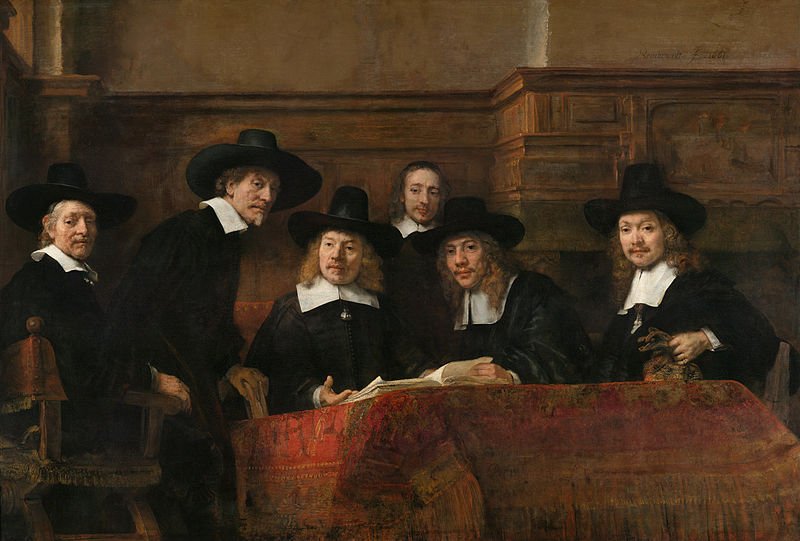
Life in a settlement is represented by six modifiers, each of which adjusts the use of specific skills within the city.
Settlement Alignment
A settlement’s alignment not only describes the community’s general personality and attitude, but also influences its modifiers.
- A lawful component to a settlement’s alignment increases its Law modifier by 1.
- A good component increases its Society modifier by 1.
- A chaotic component increases its Crime modifier by 1.
- An evil component increases its Corruption modifier by 1.
- A neutral component increases its Lore modifier by 1
- (a truly neutral city gains an increase of 2 to its Lore modifier).
Alignment never modifies a settlement’s Economy modifier.
Settlement Government
Just like nations, towns and cities are ruled by governments. A settlement’s government not only helps to establish the flavor and feel of the community but also adjusts its modifiers.
| Government | Corruption | Crime | Economy | Law | Lore | Society | Other |
| Autocracy | – | – | – | – | – | – | – |
| Colonial | +2 | – | +1 | +1 | – | – | – |
| Council | – | – | – | -2 | -2 | +4 | – |
| Dynasty | +1 | – | – | +1 | – | -2 | – |
| Magical | -2 | – | – | – | +2 | -2 | increase spellcasting by 1 level. |
| Military | -1 | – | – | +3 | – | -1 | – |
| Overlord | +2 | -2 | – | +2 | – | -2 | – |
| Secret Syndicate | +2 | +2 | +2 | -6 | – | – | – |
| Theocracy | – | – | – | – | – | – | Double the modifiers for the settlement’s alignment. The settlement gains any one of the following qualities as a ‘bonus’ quality: Desecrate/Hallow, Holy Site, Pious, Racial Enclave, Racially Intolerant, Unholy Site. |
| Plutocracy | +2 | +2 | +3 | – | – | -2 | – |
| Utopian Experiment | -2 | -1 | – | – | +1 | +2 | – |
Settlement Qualities
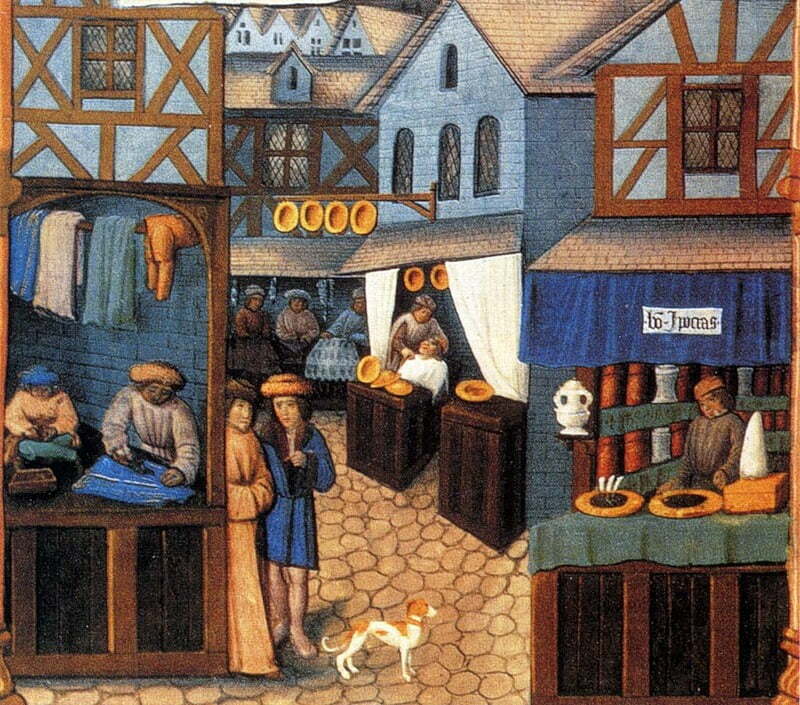
Settlements often have unusual qualities that make them unique. Listed below are several different qualities that can further modify a community’s statistics. A settlement’s type determines how many qualities it can have -once a quality is chosen, it cannot be changed.
Note that many of the following qualities adjust a town’s base value or purchase limit by a percentage of the town’s standard values. If a town has multiple qualities of this sort, add together the percentages from modifiers and then increase the base value by that aggregated total -do not apply the increases one at a time.
Settlement Disadvantages
Just as a settlement can have unusual qualities to enhance its statistics, it can also suffer from disadvantages. There’s no limit to the number of disadvantages a community can suffer, but most do not have disadvantages, since a settlement plagued by disadvantages for too long eventually collapses. A disadvantage can arise as the result of an event or action taken by a powerful or influential NPC or PC. Likewise, by going on a quest or accomplishing A noteworthy deed, a group of heroes can remove a settlement’s disadvantage.
| Anarchy |
| Atheistic |
| Bureaucratic Nightmare |
| Cursed |
| Fascistic |
| Hunted |
| Ignorant |
| Impoverished |
| Magically Deadened |
| Magical Dead Zone |
| Mutagenic |
| Plagued |
| Rampant Inflation |
| Soul Crushing |
| Polluted |
| Wild Magic Zone |
Sample Settlements
While it’s nice to be prepared, and planning out cities can be fun in and of itself, it’s not always possible to generate specific settlement stat blocks for every town and city that the PCs might visit. Sometimes the PCs decide to venture off in search of supplies instead of heading straight for the next dungeon, other times they make selling their newly acquired loot their highest priority. The following sample settlements are designed for precisely such occasions. Rather than a specific name, each of these sample settlements bears a generic title that indicates what kind of settlement it is or where it might be located.
- Sample Capital City
- Sample City of Thieves
- Sample City-State of Intrigue
- Sample Creepy Backwoods Hamlet
- Sample Dwarven Trade Town
- Sample Elven Town
- Sample Failing Fishing Village
- Sample Sleepy Crossroads Thorp
| Section 15: Copyright Notice – Pathfinder RPG GameMastery Guide Pathfinder RPG GameMastery Guide, © 2010, Paizo Publishing, LLC; Authors: Cam Banks, Wolfgang Baur, Jason Bulmahn, Jim Butler, Eric Cagle, Graeme Davis, Adam Daigle, Joshua J. Frost, James Jacobs, Kenneth Hite, Steven Kenson, Robin Laws, Tito Leati, Rob McCreary, Hal Maclean, Colin McComb, Jason Nelson, David Noonan, Richard Pett, Rich Redman, Sean K Reynolds, F. Wesley Schneider, Amber Scott, Doug Seacat, Mike Selinker, Lisa Stevens, James L. Sutter, Russ Taylor, Penny Williams, Skip Williams, Teeuwynn Woodruff. |
| Section 15: Copyright Notice – Cityscapes: New Settlement Options for the Pathfinder RPG
Cityscapes: New Settlement Options for the Pathfinder RPG © 2012, Otherverse Games; Author: Chris A. Field. |

 Buy me a coffee
Buy me a coffee